The Dictatorship
Trump renews talk about seeking a third term: ‘I would love to do it’
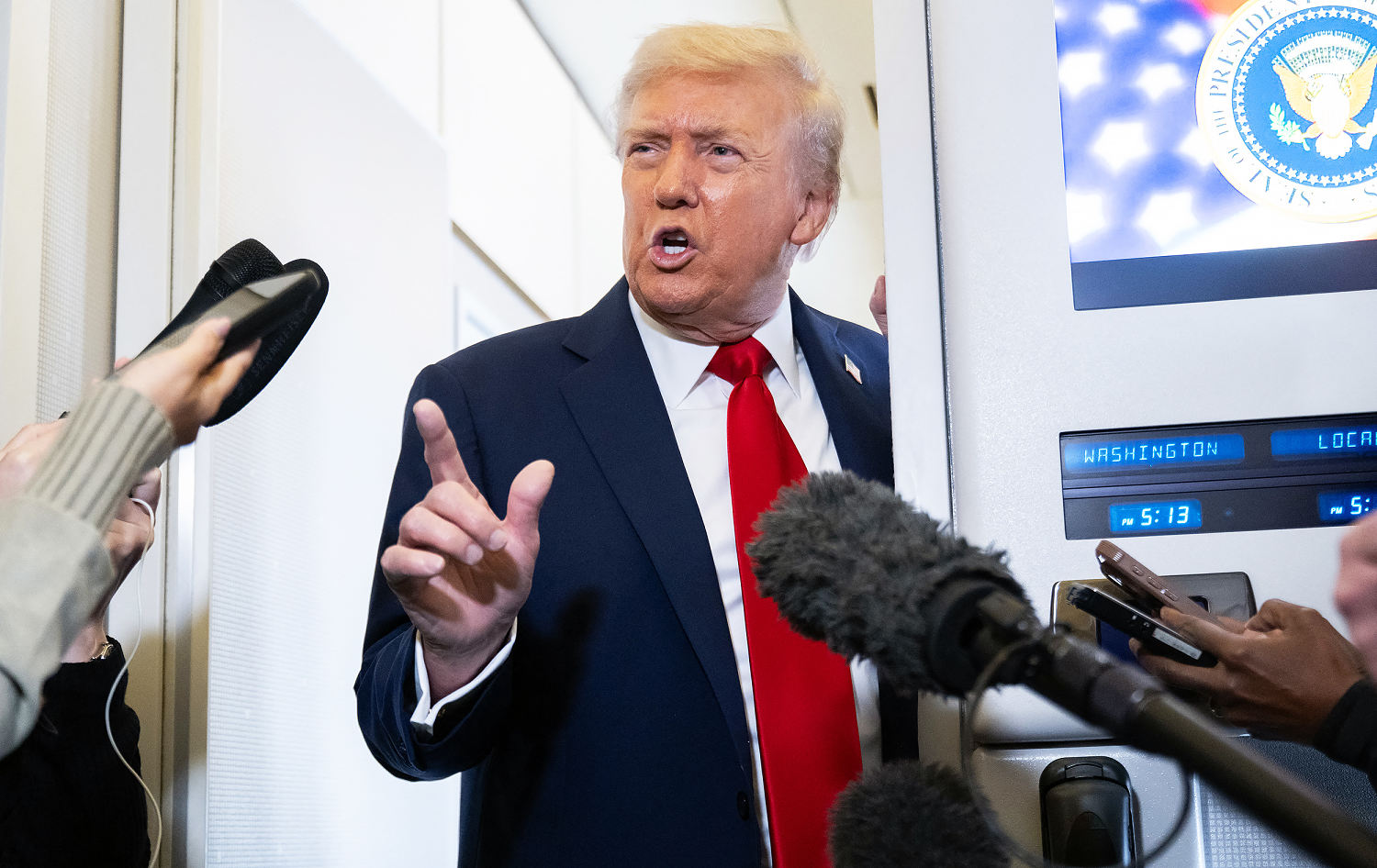
With time running out before the government shutdown began nearly four weeks ago, Donald Trump half-heartedly hosted a meeting in the Oval Office with Democratic and Republican congressional leaders from the House and Senate. To the surprise of no one, the discussion proved pointless, and the shutdown soon followed.
But during that ill-fated conversation, something weird happened: Participants noticed that red hats suddenly appeared on the president’s desk. The text on the hats read “Trump 2028.”
In the immediate aftermath, the president started publishing assorted images to his social media platform in apparent celebration of the hats and their message. In one especially jarring instance, the Republican posted an AI-generated video of Trump tossing a “Trump 2028” cap onto the head of House Minority Leader Hakeem Jeffries.
All of this was ridiculous, of course, but it was also a reminder that the president apparently likes to stoke the underlying rhetorical fire from time to time, as if another reelection bid were still a possibility for him — the Constitution be damned.
A month later, he’s leaning into the idea anew. Reuters reported:
U.S. President Donald Trump on Monday ruled out running for vice president in the 2028 election but declined to definitively say he would not seek a third term, keeping alive speculation about how he might seek to extend his time in office.
The Republican called the idea of running for vice president “too cute,” adding that voters “wouldn’t like that,” but he was far less definitive about the broader issue.
After claiming he hasn’t “thought about” the 2028 race, the Republican said he has “the best poll numbers” he’s ever had, concluding, “I would love to do it.”
His claim about not having thought about the issue was obviously silly — the hats were a dead giveaway — and the idea that his public standing is at an all-time high is demonstrably absurd.
But when Trump said he’d “love” to run again, that was believable.
In March, the president told NBC News that he was “not joking” about pursuing a possible third term. Two months later, he addressed U.S. troops stationed at the Al Udeid Air Base in Doha, Qatar, and declared“As you know, we won three elections, OK? And some people want us to do a fourth. I don’t know, I’ll have to think about that.”
There was — and is — nothing to think about. What Trump keeps referring to is plainly not legal. The 22nd Amendment to the U.S. Constitution says, “No person shall be elected to the office of the President more than twice.”
The incumbent Republican and some of his allies continue to suggest that there’s some hidden wiggle room in that phrasing, but legal scholars know better.
What’s more, the public isn’t exactly clamoring for the idea: A Washington Post/ABC News/Ipsos poll conducted earlier this year found that 80% of Americans do not want Trump to serve a third term.
I won’t pretend to know where this is headed or the degree to which the president is prepared to defy the Constitution, but Scott Cummings, a professor of legal ethics at the UCLA School of Law, made a comment on “The Rachel Maddow Show” in March that stood out for me.
Commenting on autocracies around the world that have consolidated power, Cummings noted that in none of these countries “do leaders do all the things that Trump is doing, take aim at all of these independent institutions, and then just walk away.” Rather, the professor added, authoritarians take these steps because they intend “to stay in power permanently.”
This post updates our related earlier coverage.
Steve Benen is a producer for “The Rachel Maddow Show,” the editor of MaddowBlog and an BLN political contributor. He’s also the bestselling author of “Ministry of Truth: Democracy, Reality, and the Republicans’ War on the Recent Past.”
The Dictatorship
‘Deeply disturbing portrait of America’: Nicolle Wallace rips GOP over looming SNAP cutoff
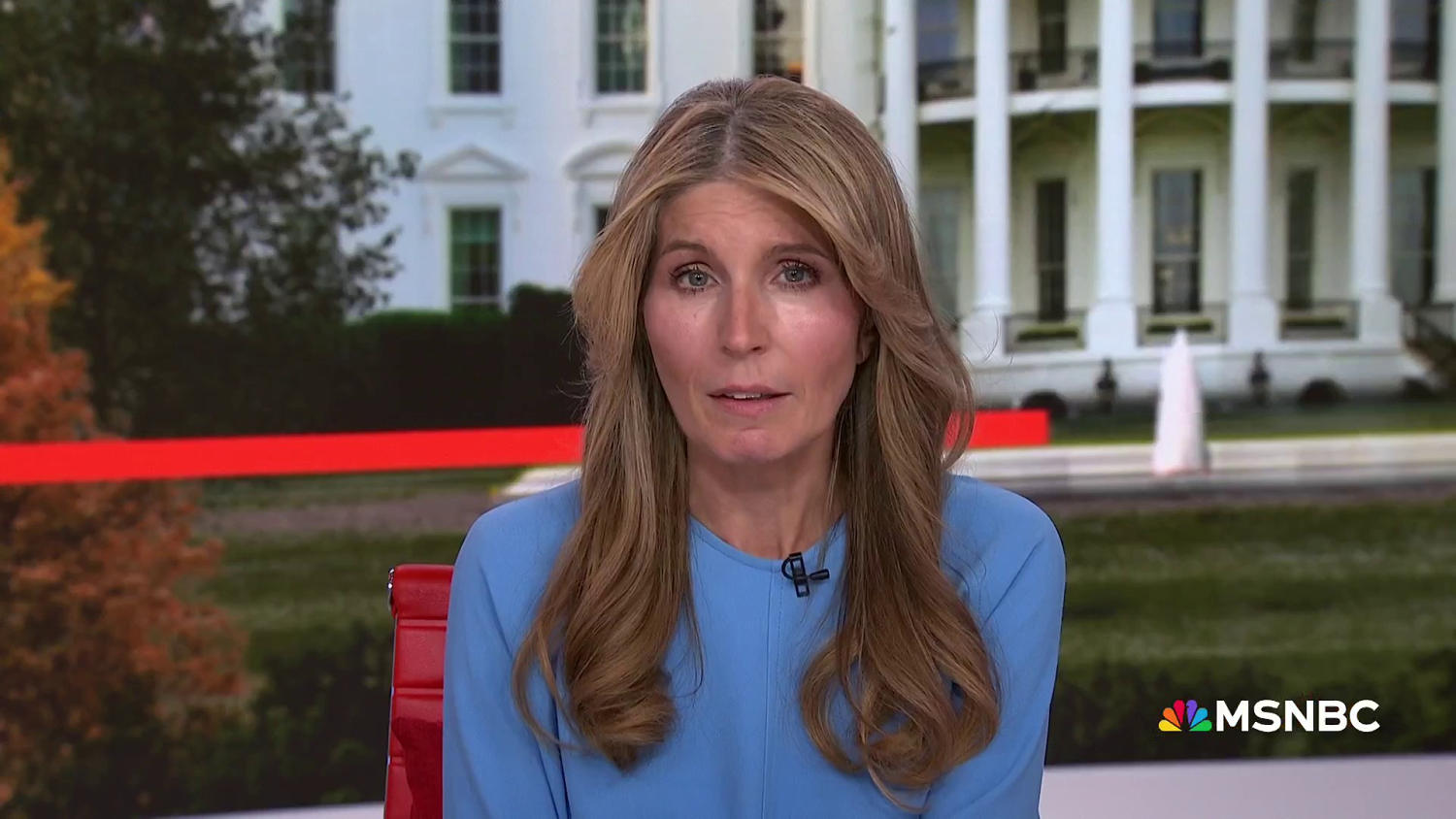
Come Saturday, the 42 million Americans who depend on the Supplemental Nutrition Assistance Program, or SNAP, will be forced to go without benefits due to the ongoing government shutdown.
On Monday’s “Deadline: White House,” Nicolle Wallace placed the blame for the looming lapse entirely on the president and the Republican Party. “It is awful when anyone in America goes hungry, and it is a choice,” she said, “it’s Donald Trump’s choice.”
The BLN host noted this isn’t the first time the administration has slashed food assistance for some of America’s most vulnerable. In March, it cut approximately $500 million in aid for food banks.
“That $300 million that Donald Trump is spending on making a gold ballroom where the East Wing once stood, and the $230 million he’s trying to get us, the American taxpayers, to reimburse him for being under criminal investigation, they add up to roughly the same amount of money he has cut from America’s food banks,” Wallace said.
The BLN host called the split-screen of Trump’s White House renovations and the impending cuts “a deeply disturbing portrait of America,” adding, “the images of Donald Trump destroying —with an actual wrecking ball — the actual East Wing of the White House, while Americans are about to go without food stamps, is a snapshot of America that will live forever.”
Wallace also called out the president for pushing “policies that will hurt the parts of the coalition he used to publicly speak out for.”
“Food insecurity in America is a lot more common than anybody can imagine, and it knows no party affiliation,” she explained. “It does not care who you voted for, and the fact that Trump and all the Republicans in Congress are opting into this tragedy, this sort of shameful thing in America in 2025, should be front-page news all over the place.”
You can watch Wallace’s full analysis in the clip at the top of the page.
The Dictatorship
Lawmakers see the pain of the shutdown — and are digging in even harder
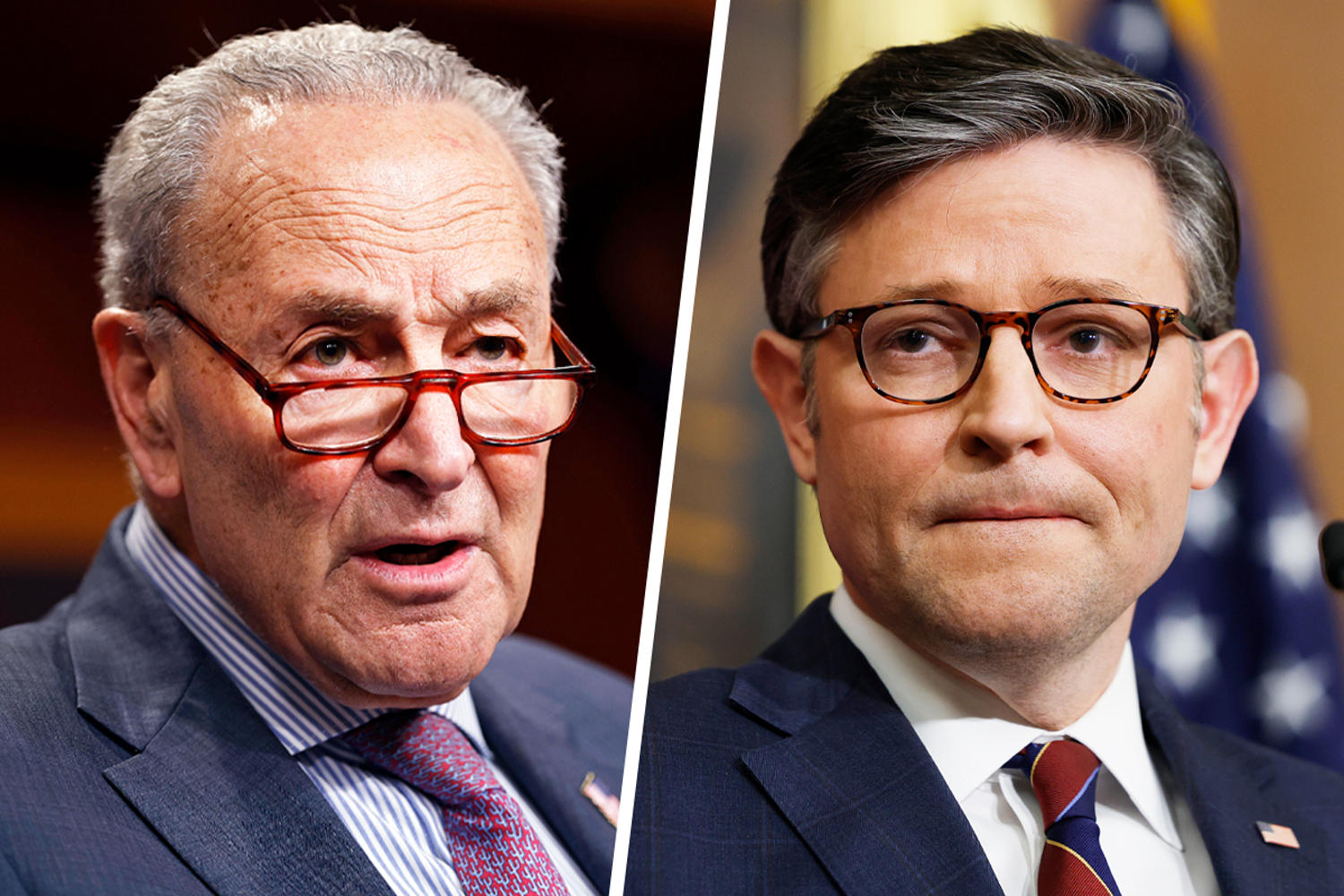
As the government shutdown reaches the monthlong milestone, both parties agree on two things: The pain is mounting, and that the other party should give in.
Republicans and Democrats widely acknowledge how the shutdown is hurting Americans. They see food benefits running outmore missed paychecks on the horizon and the prospect of low-income pregnant women, infants and children in the WIC assistance program not receiving aid.
But, thus far, the general reaction from lawmakers in both parties has been to argue that this latest pain point is just evidence that the other side needs to succumb to the demands of their party.
Republicans say the quickest way to address the escalating pain is to pass the GOP’s short-term spending bill that the House approved last month, which most Senate Democrats have shot down 13 times.
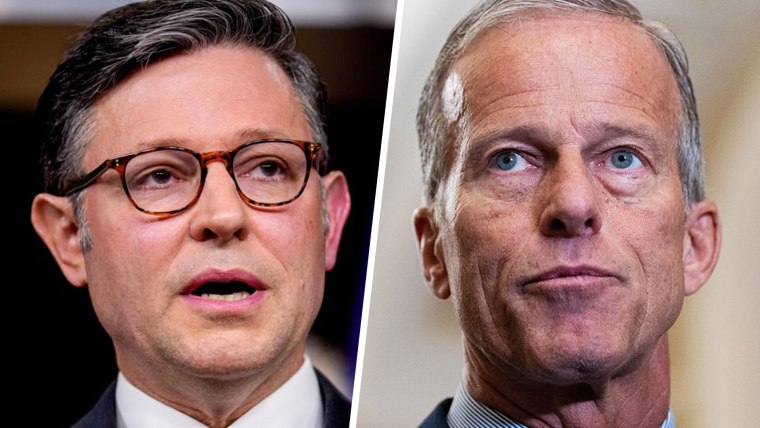
Ask a GOP lawmaker about, say, the approaching cliff for the Supplemental Nutrition Assistance Program, and they’ll agree it’s a major problem.
“It’s a serious issue, that’s 40 million Americans,” Sen. James Lankford, R-Okla., said. “It affects a lot of people, and my desire is to have this settled a month ago.”
But ask Lankford whether that SNAP cliff is affecting his thinking, and he’ll suggest “the only way” to fix the problem is for Democrats to support the Republican-continuing resolution.
“It’s the only vehicle that’s ready right now,” Lankford said.
Democrats say that proposal is a nonstarter — not because they disagree with anything in the bill, but because they want a fix to expiring Obamacare tax credits included in the legislation. Not extending those subsidies, Democrats warn, will cause health-care premiums to skyrocket for millions of Americans.
Every day that they get closer to the next pain point is to their disadvantage, and frankly, I think it exposes them to the wrath of what they consider to be their own base.”
Sen. Kevin Cramer, R-N.D.
But ask a Republican such as Sen. Kevin Cramer, R-N.D., whether open enrollment starting on Nov. 1 is an incentive for Republicans to start negotiating with Democrats, and he’ll tell you that it’s actually “a lot of incentive for Democrats to finally come to their senses and reopen the government so we can have that discussion.”
“Every day that they get closer to the next pain point is to their disadvantage, and frankly, I think it exposes them to the wrath of what they consider to be their own base,” Cramer said.
Democrats, of course, see it the other way. Senate Minority Leader Chuck Schumer, D-N.Y., said Tuesday afternoon he believes there will be “increased pressure” on Republicans to negotiate with Democrats once open enrollment begins.
But so far, that hasn’t happened — and the belief that President Donald Trump will come to the table once he sees the scope of the rising premiums may not bear out.
Democrats do, however, agree that the SNAP cliff is a big problem. From their perspective, that’s just all the more reason Republicans should work out a broader deal, with some Democrats taking offense to the suggestion that Republicans suddenly care more about food benefits than their party.
“This is the same party that cut billions of dollars from SNAP benefits in order to fund tax cuts for the ultra-wealthy,” Sen. Ruben Gallego, D-Ariz., told BLN, referring to the GOP reconciliation bill over the summer. “Now they are suddenly the protectors of people on SNAP benefits? It’s all BS.”
Gallego noted that, even if Congress approves funding, GOP lawmakers could claw the dollars back through rescissions — something Republicans have already done this year.
“I don’t trust them,” Gallego said.
Sen. Jeanne Shaheen, D-N.H., a moderate Democrat who broke with the majority of her party in March to support a GOP funding bill, agreed that Congress has to address SNAP running out of money. But she suggested that it shouldn’t come in lieu of Congress addressing the expiring Obamacare tax credits.
“We gotta be able to provide the SNAP benefits that people are entitled to, and the premium tax credits that will make health insurance affordable, and keep the government open,” Shaheen said.

The hardening of positions comes as the shutdown is on the brink of its fifth week, inching closer to breaking the current record for the longest shutdown in history: the 35-day lapse in funding of 2018-19.
During previous shutdowns, mounting pain was a key part of solving the impasses. The 2013 shutdown ended, in large part, because the U.S. was about to reach the debt limitand a major reason the 2018-19 shutdown ended was because air traffic controllers stayed home and grounded flights. But this time around, lawmakers are looking at the pain and suggesting it’s a key reason why the other side should relent.
There is hardly any inward reflection — and neither side is seeing much political blowback, with Americans narrowly blaming Republicans more than Democrats for the shutdown in polls.
“I believe both sides think they’re either winning or they’re not losing, and that’s not fertile ground for any change,” said Sen. Thom Tillis, R-N.C. “For another week or two.”
For a potentially record-breaking shutdown, the standoff has been marked by how little Republicans and Democrats are talking. The GOP position, in fact, is that they have nothing to discuss. Republicans say they will only talk about those expiring subsidies once the government is reopened. Democrats say that will leave Americans making health-care decisions with incomplete information.
Democrats think Americans should know what they’ll be paying for Obamacare before they’re forced to make those decisions during open enrollment, and they refuse to accept on blind faith that Republicans will extend subsidies in some form.
With those positions established — for Republicans, that there is nothing to discuss, and for Democrats, that the GOP has to come to the table — there’s been very little movement over the past month.
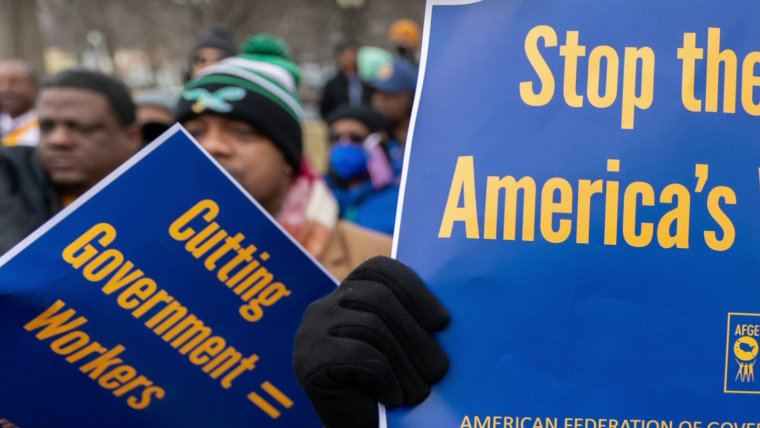
Even a statement from the American Federation of Government Employees, the largest union representing federal workers that has traditionally supported Democrats, did little to change the dynamic this week — even as AFGE called on Democrats to pass the Republican spending bill and stop “punishing the people who keep our nation running.”
Most Democrats were simply incredulous about the statement.
Sen. Tim Kaine, D-Va., noted that he works very closely with that union. “The AFGE would not want us to cut a deal and then have Trump fire a bunch of people next week,” Kaine said. “If we cut a deal and then he did that, they would come to us and say, ‘What the hell were you guys thinking?’”
When reporters asked Sen. Gary Peters, D-Mich., about the AFGE statement on Monday, he reiterated the general Democratic position: “I don’t like shutdowns.”
“I think we should never have a shutdown,” Peters said. “That’s why I hope Republicans would come with us and find common ground.”
When known asked Peters whether he agreed with AFGE’s position that the GOP funding bill should pass, he made it clear that Democrats still wanted a resolution on the Obamacare subsidies. “So I’m going to do that,” he said.
And then he succinctly summed up how lawmakers — and outside groups — seem to be talking past one another.
“I agree, we don’t want a shutdown,” Peters said. “We want to end the shutdown as quickly as possible, I totally agree with that.”
She covers Capitol Hill involving both Democrats and Republicans. She previously covered Congress at Blue Light News. She graduated from George Washington University’s School of Media and Public Affairs with a bachelor’s degree in journalism and mass communication and political science. She is a native New Yorker, Billy Joel’s No. 1fan and a Rubik’s Cube aficionado.
The Dictatorship
Trump appeals hush money conviction, citing Supreme Court immunity case and other issues
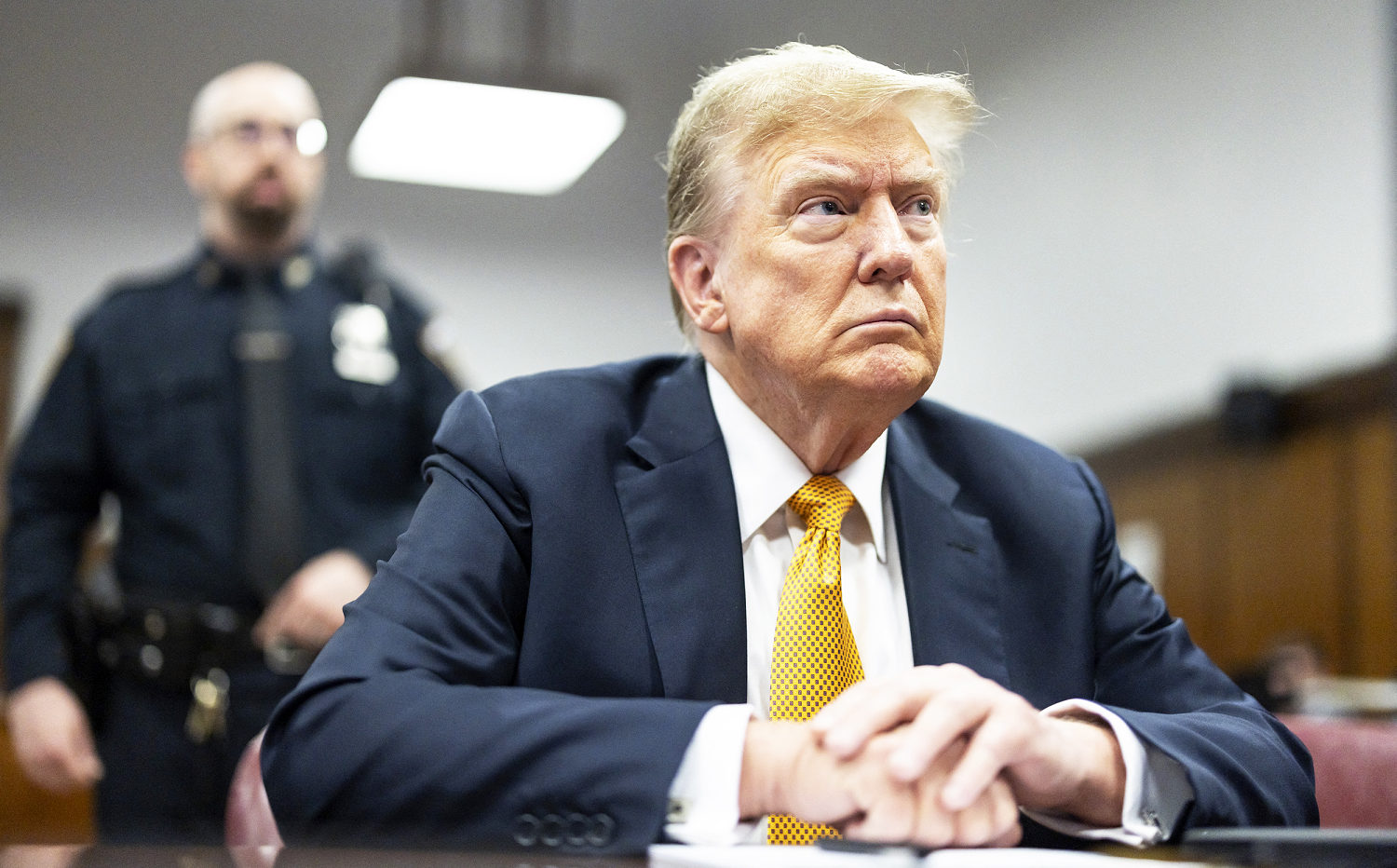
While his administration prosecutes his political opponentsPresident Donald Trump is appealing his criminal conviction in a case that he calls “the most politically charged prosecution in our Nation’s history.”
Seeking to upend his loss in the so-called hush money case, Trump’s lawyers lean on the Supreme Court’s immunity ruling from another one of his criminal cases to argue that New York state prosecutors wrongly used evidence of his official presidential acts to convict him. The jury found him guilty last year of falsifying business records to cover up a hush money scheme in connection with the 2016 presidential race.
Citing the immunity ruling’s provision against using evidence of official acts to secure convictions for unofficial conduct, his lawyers point to evidence at trial from his first term in office: discussions with White House communications director Hope Hicksstatements on social media, discussion with the attorney general and testimony about White House operations.
In previous litigation at the trial level, Manhattan District Attorney Alvin Bragg’s office argued that the immunity case “has no bearing on this prosecution” and that it wouldn’t support vacating the jury verdict “even if its reasoning did apply here.”
Trump’s brief was filed Monday to New York’s intermediate appeals court (the same court that recently gave him a partial win in his civil fraud appeal). After that court rules (it’s unclear when it will), the state’s top court could also weigh in. So could the U.S. Supreme Court, which hasn’t yet defined the outer limits of the immunity that it laid out in last year’s ruling for Trump in the federal election interference case. The president is separately trying to move the hush money appeal to proceed in federal court. Whichever path it takes, the final word on the case might not come for a while.
Trump was sentenced in January to an unconditional dischargewhich was basically a non-punishment to allow the case to wrap up before he re-entered the White House. A divided Supreme Court declined to halt his sentencing, over the dissent of four Republican-appointed justices: Clarence Thomas, Samuel Alito, Neil Gorsuch and Brett Kavanaugh.
Part of the rationale in the high court majority’s brief, unsigned order allowing the sentencing to proceed was that “the alleged evidentiary violations at President-Elect Trump’s state-court trial can be addressed in the ordinary course on appeal.” It’s that “ordinary course” that is now playing out.
The immunity issue is just one of the claims that Trump’s lawyers raise in the appeal. They also argue that the state prosecution was preempted by federal law, that the jury was wrongly instructed, that the evidence was insufficient, and that the presiding judge, Juan Merchan, should’ve recused himself.
The hush money case is the only one of Trump’s four criminal cases that went to trial. In his two federal cases — the classified documents case and the election interference case that produced the immunity ruling — the DOJ dropped them after he won the 2024 election, citing the department’s policy against prosecuting sitting presidents. The fate of the fourth case, a state election interference case brought in Georgia, is technically in limbo (though likely dead, in reality) after Fulton County District Attorney Fani Willis was disqualified from prosecuting it. The president pleaded not guilty in all four cases.
Subscribe to the Deadline: Legal Newsletter for expert analysis on the top legal stories of the week, including updates from the Supreme Court and developments in the Trump administration’s legal cases.
Jordan Rubin is the Deadline: Legal Blog writer. He was a prosecutor for the New York County District Attorney’s Office in Manhattan and is the author of “Bizarro,” a book about the secret war on synthetic drugs. Before he joined BLN, he was a legal reporter for Bloomberg Law.
-
Uncategorized12 months ago
Bob Good to step down as Freedom Caucus chair this week
-

 Politics8 months ago
Politics8 months agoFormer ‘Squad’ members launching ‘Bowman and Bush’ YouTube show
-

 The Josh Fourrier Show12 months ago
The Josh Fourrier Show12 months agoDOOMSDAY: Trump won, now what?
-

 The Dictatorship8 months ago
The Dictatorship8 months agoPete Hegseth’s tenure at the Pentagon goes from bad to worse
-

 Politics8 months ago
Politics8 months agoBlue Light News’s Editorial Director Ryan Hutchins speaks at Blue Light News’s 2025 Governors Summit
-

 The Dictatorship8 months ago
The Dictatorship8 months agoLuigi Mangione acknowledges public support in first official statement since arrest
-

 Politics8 months ago
Politics8 months agoFormer Kentucky AG Daniel Cameron launches Senate bid
-

 Politics12 months ago
Politics12 months agoWhat 7 political experts will be watching at Tuesday’s debate












